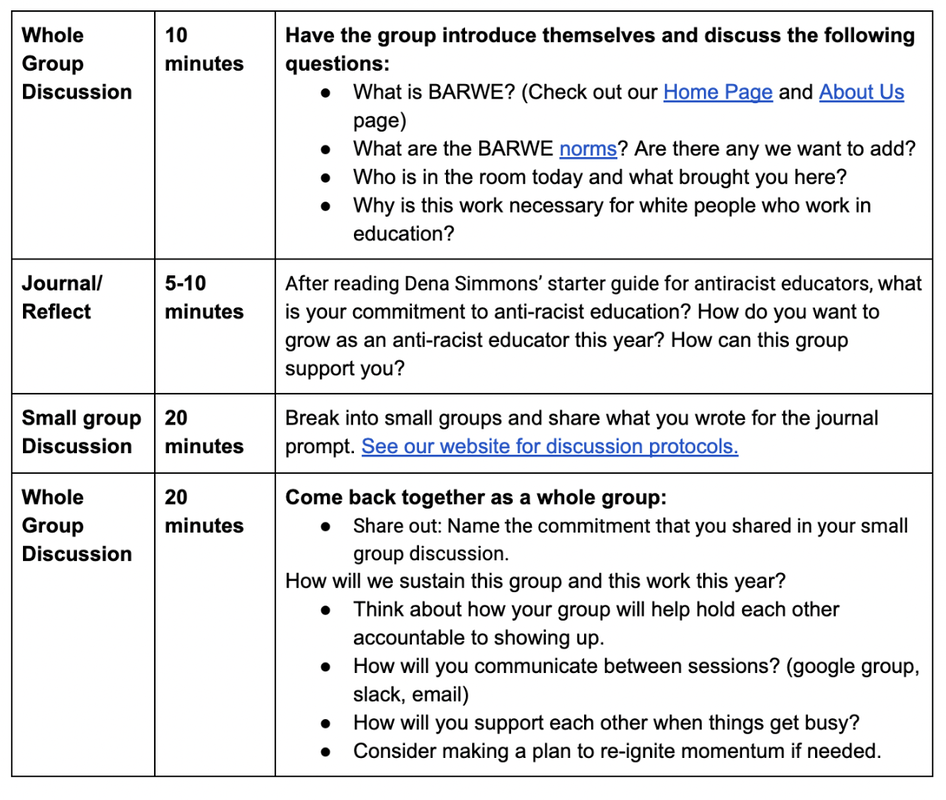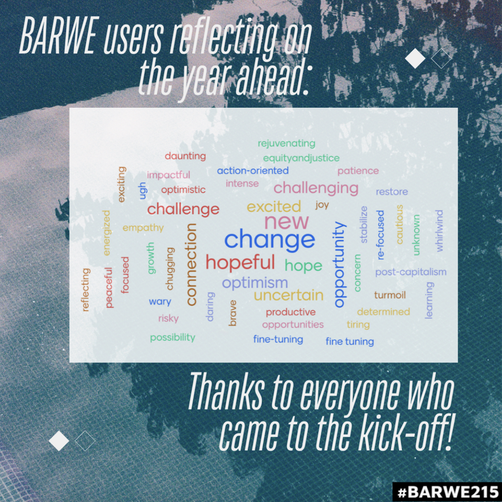- About Us
-
Inquiry Series
-
Current Year 23 - 24 School Year
>
- June: End of Year Reflection
- May: How do we support students of color navigating admissions processes?
- April: How do we support students and teachers when they face backlash for speaking out for racial justice?
- March: How can we find inspiration in white antiracists currently doing this work?
- February: How can we learn from white anti-racists of the past?
- January: How can you build solidarity across differences?
- December: How do we give ourselves space to process when we feel stuck/overwhelmed/enraged?
- November: How do we fight back against attacks on racial and gender justice education?
- October: Why is it important to understand both the history of CRT and what it has come to mean?
- September: How do we keep the focus on race as we engage in antiracist reflective practice?
- Previous Inquiry Series
- Inquiry Resources >
-
Current Year 23 - 24 School Year
>
-
Summer Events
- Writings
Don't forget to give us feedback!
Overview of BARWE and our 2022 Focus:
BARWE began sending out a monthly inquiry series in September of 2018 to encourage white educators to reflect on our own identity and biases, and interrogate the ways in which we show up in our classrooms, schools, and communities. Last year, we focused on deepening and broadening this inquiry work by continuing our multi-month dives into the specific topics of risk and partnership.
This year we will be focusing on building accountable relationships to the people doing anti-racist work in our groups, schools, and communities. Recognizing that a common roadblock to building these relationships is a fear of making mistakes and fear of conflict, the series will also focus on making conflict positive and generative.
Just as with last September, before diving into the inquiry topic through readings and discussions, we want to propose that groups take this month, September, to reconnect and recommit to the anti-racist work you’ve been engaged in. By reaffirming our relationships and shared commitment to this work, and its importance, we hope to embed the momentum needed to continue when things get challenging.
The purpose of this month’s meeting is to build community among the folks in the room in order to support our growth around antiracist practices throughout the year. Some participants may have participated in antiracist work or BARWE before; others will be starting this work for the first time in this meeting. Regardless of experience, we believe this work is ongoing for everyone, and that we all have the opportunity to grow and deepen our practice. We have created an agenda for this first meeting as a way for everyone to start on the same page and establish community as well as common understandings.
As you schedule and plan your first meeting, reflect on how you and other regular participants might intentionally make space for additional colleagues. Here are some things to consider:
Primary Article: How to be an Antiracist Educator (This is the same article as last year’s September Inquiry. We feel this is an excellent resource to start the year with, even if some participants in your group have read and discussed it already. However, if you would like to use a different resource, we suggest choosing one of the additional resources linked below.)
Additional Readings:
We have placed an asterisk next to readings with BIPOC authors.
Overview of BARWE and our 2022 Focus:
BARWE began sending out a monthly inquiry series in September of 2018 to encourage white educators to reflect on our own identity and biases, and interrogate the ways in which we show up in our classrooms, schools, and communities. Last year, we focused on deepening and broadening this inquiry work by continuing our multi-month dives into the specific topics of risk and partnership.
This year we will be focusing on building accountable relationships to the people doing anti-racist work in our groups, schools, and communities. Recognizing that a common roadblock to building these relationships is a fear of making mistakes and fear of conflict, the series will also focus on making conflict positive and generative.
Just as with last September, before diving into the inquiry topic through readings and discussions, we want to propose that groups take this month, September, to reconnect and recommit to the anti-racist work you’ve been engaged in. By reaffirming our relationships and shared commitment to this work, and its importance, we hope to embed the momentum needed to continue when things get challenging.
The purpose of this month’s meeting is to build community among the folks in the room in order to support our growth around antiracist practices throughout the year. Some participants may have participated in antiracist work or BARWE before; others will be starting this work for the first time in this meeting. Regardless of experience, we believe this work is ongoing for everyone, and that we all have the opportunity to grow and deepen our practice. We have created an agenda for this first meeting as a way for everyone to start on the same page and establish community as well as common understandings.
As you schedule and plan your first meeting, reflect on how you and other regular participants might intentionally make space for additional colleagues. Here are some things to consider:
- Send an email to your entire school to restate the purpose of this group and to make sure that colleagues are aware it exists and that everyone is invited.
- Conduct a new poll for the day/time the group meets to make sure everyone who wants to join this year is able to.
- Consider the space you have been meeting in. Is it a neutral and inviting space for new people to join? If not, consider moving it to somewhere all people feel welcome (ex. library, multi-purpose room)
Primary Article: How to be an Antiracist Educator (This is the same article as last year’s September Inquiry. We feel this is an excellent resource to start the year with, even if some participants in your group have read and discussed it already. However, if you would like to use a different resource, we suggest choosing one of the additional resources linked below.)
- This short video can also be shown during your meeting, if time allows: 6 Ways to be an Antiracist Educator
Additional Readings:
We have placed an asterisk next to readings with BIPOC authors.
- 6 Ways to be an Antiracist Educator*
- “What Anti-racism Really Means for Educators” *
- “Anti-Racist Work in Schools: Are you in it for the Long Haul?” *
- “All Students Need Anti-racism Education” *
- white supremacy and anti-blackness: a covert and overt beast*
- White Teachers Need Anti-Racist Therapy*
- Abolitionist Teaching and the Future of Our Schools*
- (divorcing) White Supremacy Culture
- Dismantling Racism: Analysis Tools
- NMAAHC Talking about Race: Whiteness
- Educate to Liberate: Build an Anti-Racist Classroom
Facilitation Reference Guide:
Feedback Form:
As we grow in year three, we hope that one person in your group can take a few minutes to fill out our feedback form to let us know how it went.
Here are reflections from previous meetings:
- Set a day and time for your group to meet - Make sure to send reminders. If you’re meeting in person, snacks are always a good idea!
- Send this month’s Primary Article to your group. Look through the additional readings to see if there is another reading that might be better suited to your group and its interests.
- Prepare yourself to facilitate by reading through our Norms and Discussion Protocol.
- Pass the Hat and collect donations for LiberatED this month.
- Complete the Feedback Form.
- Prepare yourself for October by setting a date and time, inviting colleagues, and looking out for our next Discussion Guide on October 1st.
Feedback Form:
As we grow in year three, we hope that one person in your group can take a few minutes to fill out our feedback form to let us know how it went.
Here are reflections from previous meetings:
Thank you all for your feedback so far, please keep it coming!
Pass The Hat:
In addition to being accountable to our colleagues and students of color, we believe it is important to be financially accountable to people of color who are doing this work on a daily basis. Each month, we will recommend an organization led by people of color, in education and beyond, doing the work of pushing for justice.
At the end of each monthly discussion, pass a hat (or a box) and collect donations for the designated organization. You can then have one group member go online and donate in the name of your school. If you want, you can add “Building Anti-Racist White Educators” after your school name.
This month, we encourage you to donate to LiberatED. LiberatED was founded by Dena Simmons. It is a social and emotional learning approach to racial justice and healing. It is a movement, a collective, and path towards liberation.
Pass The Hat:
In addition to being accountable to our colleagues and students of color, we believe it is important to be financially accountable to people of color who are doing this work on a daily basis. Each month, we will recommend an organization led by people of color, in education and beyond, doing the work of pushing for justice.
At the end of each monthly discussion, pass a hat (or a box) and collect donations for the designated organization. You can then have one group member go online and donate in the name of your school. If you want, you can add “Building Anti-Racist White Educators” after your school name.
This month, we encourage you to donate to LiberatED. LiberatED was founded by Dena Simmons. It is a social and emotional learning approach to racial justice and healing. It is a movement, a collective, and path towards liberation.

